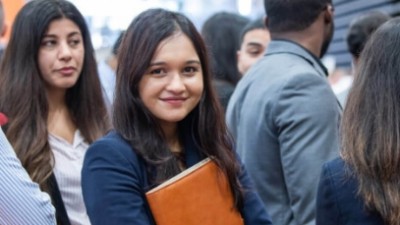Rochester Institute of Technology (RIT) recently had the honor of participating in the Symposium on Accelerating Science, Technology, and Circular Innovation in Southeast Asia, hosted by the U.S. Department of State in Jakarta, Indonesia.



A significant credit for this impactful event goes to Helen Santiago Fink, Program Manager at the U.S. Department of State, who not only played a pivotal role in orchestrating the symposium but also delivered insightful opening remarks alongside Dr. Professor Clyde Hull. RIT's participation showcased its continued commitment to fostering sustainable economic growth and innovation in the ASEAN region through entrepreneurial development.
Circular Economy Takes the Spotlight
Dr. Professor Clyde Hull, an esteemed faculty member of RIT, initiated our contributions by introducing a groundbreaking project aimed at bolstering the circular economy in the ASEAN region. This project, in collaboration with other esteemed institutions, seeks to train entrepreneurs and provide essential research to stimulate innovation.

Israa Thiab, RIT's visiting assistant professor, then delved into our specialized circular economy entrepreneurship curriculum tailored for incubators and universities. Her engaging presentation underscored the educational content being developed to train and equip circular economy entrepreneurs with the skills they need to thrive.

Highlighting a more specific case study, Dr. Professor Eric Williams and our PhD student Shenying Zhang held an illuminating discussion about the material flow analysis of e-waste in the ASEAN region. This topic is of paramount importance, given the significant environmental and economic impacts e-waste poses. Their findings on the current states of e-waste and potential interventions offer a promising path to improved circularity in this critical sector.


A Real-World Transformation
Jim Salzano, RIT's distinguished alum, shared a captivating narrative about sustainability and business success. His talk provided invaluable insights into how Jones & Vining, under his visionary leadership, transitioned from a conventional business model to a more sustainable and successful circular one.


In a dynamic shift from traditional lecture formats, Assistant Professor Israa Thiab showcased the circular entrepreneurship curriculum through a hands-on workshop in Jakarta. This interactive session, spanning 3.5 hours, gave participants a deep dive into the principles of circular economy. The workshop's innovative approach ensured that entrepreneurs, incubator directors, and university representatives walked away with a profound understanding of sustainable economic practices with a lot of fun activities and discussions.
Building Partnerships and Charting the Way Forward
Furthering the dialogue on the circular economy, Dr. Professor Eric Williams and Israa Thiab engaged leading figures (entrepreneurs, Incubators, and entrepreneurship enthusiasts) from the ASEAN region in two different workshops. Through a series of engaging activities and in-depth discussions, attendees explored avenues to further the circular economy in the region.






During the symposium, we also held four Memorandum of Understanding (MOU) ceremonies, establishing the foundation for future collaborations.




In a pivotal encounter, Dr. Professor Clyde Hull met with Assistant Secretary of Defense Mr. Daniel J. Kritenbrink. Their discussion revolved around the potential of the circular economy in the ASEAN region, the broader implications of our ongoing projects, and the immense help and support we are getting from the U.S. department of state and Helen Santiago Fink (Program Manager).


RIT's Vision for the Future
The Jakarta symposium provided a platform for RIT to share its dedication to nurturing the entrepreneurship ecosystem in the ASEAN region. Our project's unique focus on the circular economy offers budding entrepreneurs invaluable insights into creating long-term value, reducing waste, and promoting environmental stewardship.
In collaboration with incubators, our tailored courses and extensive resources empower entrepreneurs to implement sustainable practices, ensuring their businesses flourish while contributing positively to the environment.
In Closing
The U.S.-ASEAN Smart Cities Partnership, in collaboration with Arizona State University and RIT, has truly outdone itself in orchestrating an event that emphasizes the U.S.'s commitment to advancing science, technology, and innovation in the ASEAN region. RIT is proud of its contributions to the symposium, and we are excited about the many opportunities and collaborations that lie ahead as we work collectively to drive the principles of the circular economy forward.













